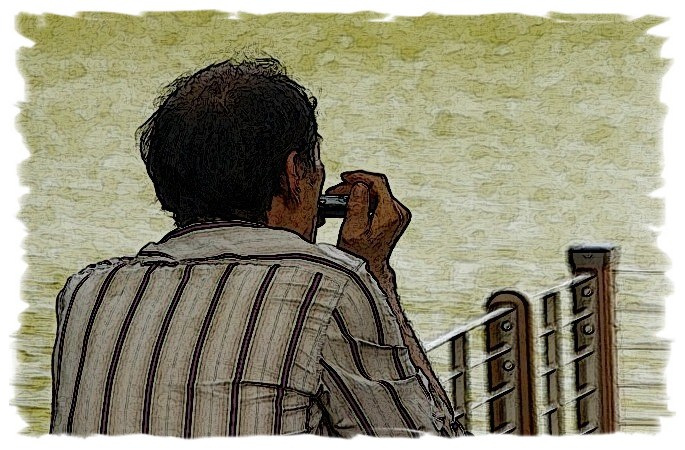How to ‘actually’ play a mouth organ?
Or a harmonica, as Sugunan Sir called it.
Be it someone who could play it well. And by well, I mean really well, not just the famous ‘La vie en rose’ piece or a few basic jazz notes. Someone who could play the whole melody of ‘This time I’m gone for good’ without so much as a broken note when they had to draw their breath in. Even that someone, if they called it a mouth organ, even if they almost always remembered to call it a harmonica in his presence and they happened to slip up just once, suffered a minute or two of ‘sweetness’-as he called it- from his mouth.
“It is a harmonica for Lord Almighty’s sake, you see.” He used to start with that. Or some other biblical reference to God’s name. Sometimes I thought he did that to irk Sister Alexis as she lingered a little too often in the music section. It was not on account of her interest in music.
Even I could see that.
“Please call it that, or a Blues Harp if you absolutely should, you won’t definitely be calling it a French Harp anyway, you know too little of history to bring meaning to that name.”
Some personal comments were made as well, but the crux of his scolding remained the same, that Harmonica is the name best suited to this lovely musical instrument, and one should never call it by that abhorrent name: Mouth Organ. A name that yours truly happened to have fallen in love with a long time back, way before I had ever met Sugunan Sir or Selva or anyone in this school for that matter.
It so happened that my father was an IPS Officer, and we were transferred from Ranchi to this district of Alleppey -or Allapuzha as Selva called it- about a year ago. My father got transferred a bit too much. I have, until today, never been able to complete one whole school year in one city.
My mother says that it is a good thing my father getting transferred. She says it is a mark of honesty of an officer. She has had 8 large aluminium boxes for as long as I can remember. She fills these up in no time at the news of the next transfer, and off we go. I like to travel, though. I like it here as well. I feel you can like any place if your mother comes along. I asked my father if the number of transfers is directly proportional to his honesty. He told me my math teacher was good.
I had fallen in love with the mouth organ when I was in Ranchi. I was watching TV, and my father was sitting beside me, reading the newspaper. I stopped at a channel where I saw two friends riding a motorcycle with a sidecar, singing along and being very happy with themselves while doing it. I liked it instantly. To my surprise, even father seemed to like it. He left his newspaper, and we watched the film together. The film was Sholay. It features two friends, Jai and Veeru, who are best friends. They’re like the Swat Kats. They’re small-time thieves, Jai and Veeru. You later come to know that even though the bike they were riding was stolen, but you still like them. It happens that way sometimes; you like thieves more than you like normal people. Even my father, who’s a police officer and should usually detest thieves, seemed to like them. They always stay together and decide on important stuff by coin toss.I also keep a coin with me the most time.
I do not decide stuff by a coin toss, though. I like the sound of a coin being tossed in the air. So our Jai and Veeru are contacted by one Mr Thakur, -a former policeman- who offers them a lot of money if they catch a dacoit. This Mr Thakur always wears a shawl and gets most of his work done through his loyal servant. I felt terrible for him, the servant, I mean, and asked the father if all rich people are this way. He told me to keep watching the film. We later come to know that Mr Thakur has no hands. He used to have them before, but they were cut by this same dacoit some time back. So Jai and Veeru accept the offer and reach Mr Thakur’s village. Here Jai plays this fantastic piece on his mouth organ. Only I didn’t know it was called a mouth organ then. I asked my mother, and she told me the name. I loved the tune, loved the instrument, and obviously wanted it as my next birthday gift. I had been wanting to play that Sholay tune perfectly on a mouth organ since that day but had never succeeded.
Then I came here to Alleppey, joined this school and met people who talked about mouth organs. Sugunan Sir talked about mouth organs the most. Only he didn’t call them that. As I’ve told you before. It was his favourite musical instrument. He said it was a traveller’s relief. An instrument suited to travelling singers or singing travellers. “Not a guitar, of course not,” he said. Replying to an obvious query by Selva. Selva didn’t like mouth organs much, didn’t like musical instruments much, he didn’t like music much either. What he liked was to hear Sugunan Sir narrate stuff. “Just tease him a little with opposing views, look genuine while doing so and bam, you’ve earned yourself a story from him.” He didn’t do it to make fun of Sir, though. I could see that he really loved listening to stories. Selva was my friend.
Sir continued, “No matter what your new age adventure stories tell you, guitars are not suited to travel. Like all string-based instruments, guitars are high maintenance. They need constant tuning as the strings tend to get loose. And then if a string breaks you won’t get a new one for a long time while on the road. And it is not as easy to carry a guitar around as your bearded heroes from your favourite Westerns would make you believe. Now a Harmonica on the other hand -you could catch a note or two of the said instrument in his voice at that time- fits easily in a corner of your travel bag, takes hardly any space, needs little maintenance and sounds so…”
“Amazing?” Selva prompted when Sir stopped for breath, knowing what would happen.
Sugunan Sir didn’t like words of open-ended praise. Words like amazing, awesome, and stupendous sounded hollow to his ears. He believed using such words shows laziness on the part of the listener or observer of art. “Melodious. Use words of meaning, kid. Or if you haven’t got the right words for the moment just express how you are feeling somehow. Someday you’d know the right words if you go this way, till then do not seek refuge amongst glib words, please. Next you would all start calling everything ‘content’. Now, a Harmonica being a free wind instrument…” Sir would continue, and I’d see Selva smiling his mystery smile. I now know it is the smile of satiety. Didn’t know it then. I realized what it meant when I watched The Shawshank Redemption. When Andy says, “I’d only ask three beers apiece for each of my coworkers” for helping one of the jailers and then later, when they get the beers, sits down at the parapet of the wall and has, in the words of Red: a strange little smile on his face.
The best and the easiest way forward was to ask Sugunan Sir to teach me how to play the mouth organ. The only catch was that it wasn’t easy at all. It involved an ideological battle within me. For him to teach me and to teach me well, I would have had to call it a harmonica, and I simply couldn’t call it that. It resembled a Harmonium too much; the name and the musical instruments are poles apart in every aspect. It was as if the both of us were in love with the same girl and had given her nicknames of our choice, and now I had to call her by the name given by him. I tried but couldn’t. I took the second route, stayed back in the computer lab one day and tried searching on the internet- ‘How to play a mouth organ?’
I heard footsteps behind me and turned to see Selva and Sugunan Sir standing right there. Sir came forward and corrected my search: ‘How to actually play a mouth organ?’ And then he switched the computer off.
I looked at Selva. He was smiling that damn smile of his.



